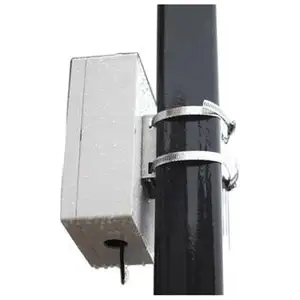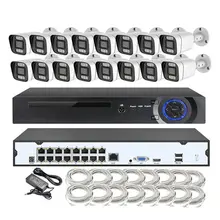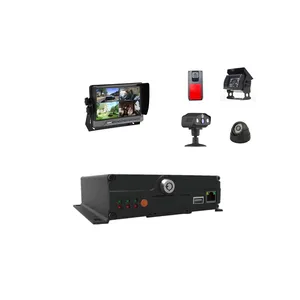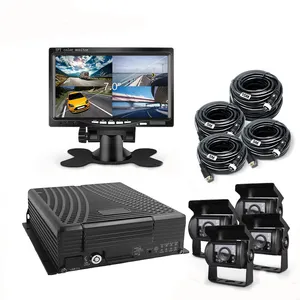What are Network Video Recorders?
Network Video Recorders (NVRs) are sophisticated devices designed to manage, record, and store video footage from network cameras in a surveillance system. They are an essential component in modern security systems, providing a centralized platform for monitoring multiple streams of high-resolution video from IP (Internet Protocol) cameras. NVRs are intended for use by a wide range of users, from small businesses to large enterprises, as well as residential properties looking to enhance their security measures.
The principle operation of an NVR is based on receiving digital signals transmitted over a network from IP cameras. Unlike traditional DVRs (Digital Video Recorders), which are connected directly to analog cameras, NVRs work with cameras that encode and process the video data themselves before transmitting it. This allows for greater flexibility in camera placement and scalability of the system. The NVR records and stores this data, often on hard drives or connected storage devices, allowing for both real-time viewing and retrieval of historical footage.
An NVR system typically includes software that provides an array of features such as remote monitoring from different locations, motion detection alerts, and user management. The software interface allows users to configure settings specific to their surveillance needs, like setting recording schedules or defining motion detection zones. With advancements in technology, many NVRs now support sophisticated algorithms that can analyze video content for specific events or objects, enhancing the overall effectiveness and intelligence of the surveillance system.
Types of Network Video Recorder
Different types of Network Video Recorders are available to suit various surveillance needs:
Standalone NVR: These units are independent devices that contain the hardware and software necessary to record and manage IP cameras. Standalone NVRs are popular in smaller installations where simplicity and ease of use are crucial.
Software-based NVR: This type involves installing specialized software on a computer or server that performs the functions of an NVR. It's highly customizable and can be scaled up with additional storage or processing power as needed.
Hybrid NVR: Hybrid Network Video Recorders can support both IP cameras and analog cameras, making them ideal for systems that are being upgraded from an older analog system to a more modern IP-based system.
Edge-based NVR: In this setup, the recording capabilities are built directly into the IP cameras, which then transmit the recorded data to the NVR for storage and management. This can reduce network traffic since video is processed at the camera rather than at the recorder.
Cloud-based NVR: Cloud-based solutions involve storing footage in remote servers accessed via the internet. This offers advantages like off-site storage for increased security and accessibility from any location with internet access.
How to choose Network Video Recorder
Choosing the right Network Video Recorder involves considering several factors that align with your security requirements and infrastructure:
Number of Channels: Determine how many cameras you need to connect now and whether you anticipate expanding your surveillance system in the future. NVRs come in various channel capacities to accommodate different numbers of cameras.
Storage Capacity: Evaluate how much video you need to store and for how long. More high-resolution cameras will require larger storage capacities. Options include built-in hard drives, external storage solutions like NAS (Network Attached Storage), or cloud services.
Resolution Support: Ensure that the NVR can handle the resolution of your IP cameras. For high-definition surveillance needs, choose an NVR that supports Full HD or 4K video.
Advanced Features: Decide if you need advanced features like motion detection, face recognition, or analytics capabilities. These features can provide smarter monitoring but may require more powerful hardware.
Network Capabilities: Consider the network compatibility such as Wi-Fi support or PoE (Power over Ethernet) features that simplify camera installation by providing power through the network cable.
By assessing these considerations against your operational needs and budget constraints, you can select an appropriate NVR that provides reliable surveillance and meets your security objectives.
Best Network Video Recorder on Alibaba.com
Alibaba.com is renowned for its comprehensive selection of Network Video Recorders suitable for varied business needs around the globe. With a vast array of options from numerous suppliers, businesses can find the perfect match for their specific security requirements without compromising on functionality or quality. Whether you're looking for advanced features like human motion tracking and face recognition or simply need a robust waterproof unit for outdoor use, Alibaba.com caters to all specifications.
The platform's commitment to facilitating smooth international trade is evident in its user-friendly interface and services such as Trade Assurance that help protect payments until delivery is completed. Buyers can rest assured knowing they have access to a wide selection of products that can be tailored through customized logo printing or software reengineering services provided by suppliers on Alibaba.com. Moreover, with options ranging from compact mini cameras to large-scale multi-channel recorders, businesses can scale their security infrastructure as they grow.
Choosing Alibaba.com for sourcing Network Video Recorders means tapping into a global marketplace where quality meets reliability. It's not just about purchasing products; it’s about building partnerships with trusted suppliers who understand the importance of safeguarding assets through state-of-the-art surveillance solutions.
Common FAQs for Network Video Recorders
What is a Network Video Recorder (NVR)?
A Network Video Recorder is a device that records and stores video footage from networked IP cameras used for surveillance purposes. It allows for real-time monitoring and playback of recorded video.
How does an NVR differ from a DVR?
An NVR records video from networked IP cameras, whereas a DVR (Digital Video Recorder) records from analog cameras. NVRs receive digital video streams over a network, offering higher resolution footage and more flexible installation options.
What should I consider when choosing storage capacity for an NVR?
You should estimate the amount of footage you plan to store, considering factors such as the number of cameras, recording resolution, frame rate, and how long you need to retain the footage. Higher resolution cameras and longer retention periods typically require more storage.
Can I use existing analog cameras with an NVR?
Analog cameras are not directly compatible with NVRs because they do not use network protocols. However, hybrid NVRs or video encoders can bridge the gap by converting analog signals into digital format compatible with NVRs.
What are the benefits of using high-resolution IP cameras with an NVR?
High-resolution IP cameras paired with an NVR offer clearer, more detailed images, which are crucial for identifying individuals or objects in surveillance footage. They also allow for better digital zoom without significant loss of clarity.
Do all NVRs support Power over Ethernet (PoE)?
Not all NVRs support PoE. When purchasing an NVR, check if it has built-in PoE ports that can power PoE-enabled IP cameras through the network cable, simplifying installation and reducing cabling requirements.
How do motion detection features work on an NVR?
Motion detection on an NVR works by analyzing the video feed from connected IP cameras and detecting changes in pixels between frames. When motion is detected, the NVR can be configured to send alerts or start recording.
What is meant by channels in an NVR?
Channels refer to the number of individual camera feeds that an NVR can process and record simultaneously. The number of channels required depends on how many cameras you need your system to support.
Can I access my NVR remotely?
Most modern NVRs allow for remote access through mobile apps or web interfaces. This enables users to monitor live feeds and access recorded footage from any location with internet connectivity.
What is the difference between cloud-based and local storage for NVRs?
Cloud-based storage involves saving recorded video to remote servers accessed via the internet, while local storage saves footage directly on physical hard drives within the NVR or connected storage devices.
Is it possible to upgrade the storage capacity of an NVR?
Many NVRs allow for storage expansion by adding additional hard drives or connecting external storage solutions like NAS devices. Check the specifications of your NVR for available expansion options.
Are there any legal considerations when installing an NVR surveillance system?
Yes, there are privacy and data protection laws that must be considered when installing surveillance systems. Ensure compliance with local regulations regarding recording public areas and notifying individuals about surveillance activities.
How does face recognition work on an NVR?
Face recognition in an NVR uses algorithms to analyze video footage and identify human faces within the camera's view. This technology can be used for enhanced security measures such as access control or identifying known individuals.
What is ONVIF compatibility in relation to NVRs?
ONVIF (Open Network Video Interface Forum) compatibility ensures that different brands of IP cameras and NVRs can work together using common protocols. It's important for ensuring interoperability between devices in your surveillance system.



































 浙公网安备 33010002000092号
浙公网安备 33010002000092号 浙B2-20120091-4
浙B2-20120091-4